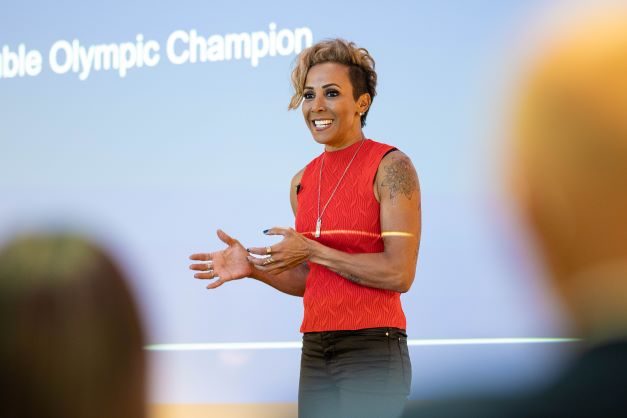Culture and behaviours
‘To talk about issues of your own sometimes has a negative connotation – Why should it?’ – Col. Dame Kelly Holmes on mental health at work
At the British Safety Council conference, double Olympic gold medalist, Col. Dame Kelly Holmes suggested employers nurture an open line of communication to avoid mental health being viewed in a negative way.
Speaking at the 12th annual British Safety Council conference, held in London, Col. Dame Kelly Holmes told delegates that discussions around mental health in the workplace had previously only been acknowledged via a “couple of pages at the back of a staff handbook”, akin she said, to a “token” of a mental health and wellbeing section guide rather than a proper communicative structure.

Col. Dame Kelly Holmes speaking at the British Safety Council Conference
Holmes mentioned that health and safety still focuses much on the physical safety of employers, and stated that both mental and physical health are “as important as each other” and should be communicated as such in the workplace as people are “probably struggling”.
Discussing her time as an athlete in the “elite level of sport”, the former Olympic Champion said there was little support around wellbeing, and that there wasn’t “a transparent method for athletes to go and talk about concerns that they had as a person”. She continued: “…it wasn’t a thing […] it was very functional. There would be the physios and nutritionists that we could go and see because that was performance-led, but there was nothing holistic”. As such, the internalisation of her own personal troubles would have a “negative impact” on her mental health, with Holmes stating “there was a price to pay on me as a person”.
The multiple injuries the former athlete suffered over a seven-year period, was “directly” down to “stress and worry” along with hard training to be the best, highlighting how her mental health directly impacted her physical safety. She admitted she suffered “professional burn outs” and “breakdowns” which was “perpetuated from this elite pressure that I felt […] and also not living my authentic life”.
Linking this to the office or other places of work, she stated that “not everyone is living their lives, [and] not everyone is in the present with no stresses, no worries”. Holmes explained that people may be struggling for a number of reasons, “especially now” with financial, family or emotional stress, but from the outside may show up for work and “smile”.
This ‘hidden’ stress is reflected in the numbers by a work-related ill health HSE report, which states that 1.7 million workers are suffering from a work-related illness, around half of which is stress, depression or anxiety. Holmes added: “You see people do the winning aspect, the end result and you judge the performance of the person based on the end result, but what you don’t see behind it is all that anxiety and stress.”
Expanding on this, Holmes said that employees are expected “to portray the person you’re meant to be and still perform with issues of your own. To talk about issues of your own sometimes has a negative connotation, sometimes it has a sense of weakness, a sense of not being good enough to do your job when you open up about yourself – why should it?”
Holmes echoed this for her own personal story adding: “Up until June this year […] where I announced publicly that I was a gay woman, I wasn’t living my authentic life.”
She lamented the lack of provisions both for mental health and the LGBTQ community during her athletic career, and candidly shared how she suffered in silence: “…those pressures led me to depression, to be a self-harmer, to have a massive breakdown and these were at the age of 33, the year before I won those two gold medals and no one knew.
“There is an element there when I could say that was the best time in my life, but that was [me] showing up to work as well”.
Holmes did highlight that having a mental health first aider in organisations is “great”, however one person is often left to “deal with everyone’s issues” along with, in many cases, doing their own job and being a first aider as an addition.
Concluding, Holmes urged for “acceptance” on being able to speak openly about personal issues in the workplace if we are to properly address wellbeing and mental health successfully.
‘To talk about issues of your own sometimes has a negative connotation – Why should it?’ – Col. Dame Kelly Holmes on mental health at work
At the British Safety Council event this month, Col. Dame Kelly Holmes addressed delegates by discussing wellbeing and mental health in the workplace.
Rhianna Sexton
SHP - Health and Safety News, Legislation, PPE, CPD and Resources Related Topics
Aviation company fined after worker death at Heathrow Airport
Gogglebox star George Gilbey died after fall through skylight
Tobacco firm fined £32,000 following machinery failures

